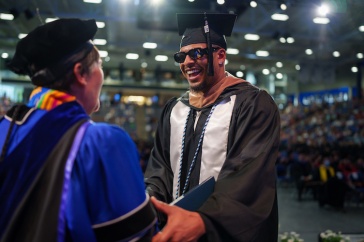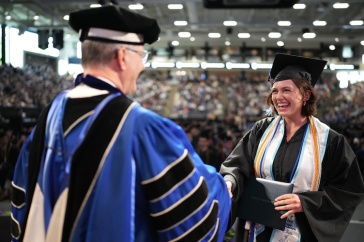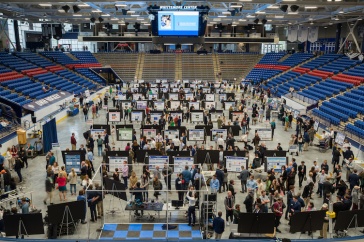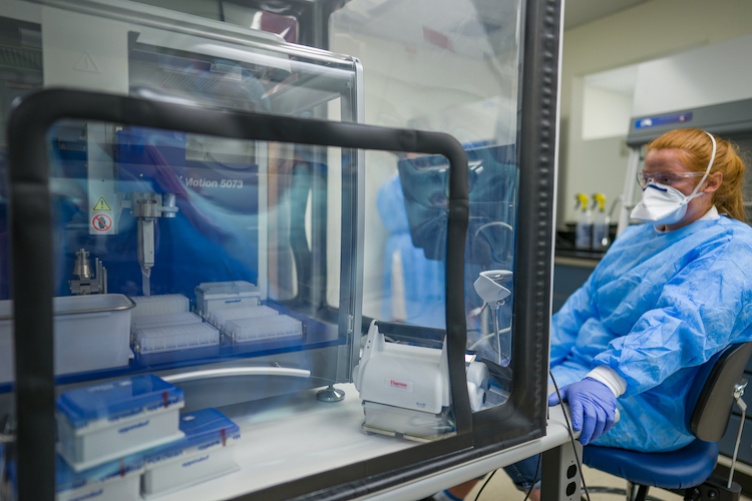
When the COVID-19 pandemic began spreading rapidly throughout communities around the globe earlier this spring, Ian Ayer ’22 knew he wouldn’t last long lounging comfortably in the family living room.
“As an aspiring medical student, I felt bad at the beginning of the pandemic just sitting back and watching on TV as all these doctors and nurses sacrificed not just their time and safety but, in a lot of cases, put their lives at risk,” says Ayer, a pre-med biomedical science: medical and veterinary sciences major in the College of Life Sciences and Agriculture (COLSA). “I felt guilty not doing anything, just sitting on the couch in my parents’ house.”
He didn’t sit for long, and he’s since built a schedule that doesn’t allow for much sitting at all. The instinct to make a difference prompted Ayer to seek out a position with Convenient MD as part of UNH’s COVID-19 testing operation. (Convenient MD partnered with UNH for the testing program). He has since joined UNH’s on-campus testing team, putting in as many shifts as he can, and is also working in the same role in Manchester and Concord at UNH Manchester and UNH Law, respectively.
Additionally, Ayer picked up work in the same capacity for New England College in Henniker and Franklin Pierce University in Rindge, the latter of which requires a nearly two-hour drive to report for duty.
“It’s not every day you live through a historic event like this, and it seems surreal that a few years down the road I’ll be able to tell people that at the height of the pandemic, I was testing people."
“I am very grateful to be part of the COVID testing program. When Convenient MD started hiring UNH students, I was more than happy to join the force,” Ayer says.
That force is a team of fellow students who have stepped into vital positions to bolster UNH’s battle against the coronavirus. They were part of the group that put in 10-hour shifts this summer when students returned from break and thousands of tests needed to be administered and processed quickly, and they are part of the cohort that continues to administer weekly tests for faculty and staff.
Others have taken technician roles in UNH’s testing lab, which has been hugely influential in allowing the university to complete in-person learning through the fall semester, something numerous other schools throughout the region and the country failed to manage.
“I am really proud that UNH has handled this so well and can be a leading example for the rest of the country to follow,” says Jessica Leighton ’21, a genetics major in COLSA who has worked as a tester and in the lab.
That’s not hyperbole, either. UNH’s procedures have indeed drawn praise from influential national figures leading the fight against COVID-19. During an Oct. 12 visit to the lab, U.S. coronavirus response coordinator ambassador Deborah Birx lauded UNH for being “one of the institutions in the country that answered (the) call” to find ways to keep campuses open.
The lab features state-of-the-art instrumentation and can process as many as 4,000 samples per day, with test results typically generated in fewer than 48 hours. The samples examined include those collected at UNH’s testing locations, which allow patients to walk or drive up and have a nasal swab test completed.
Leighton began her work as a tester, switching between roles that involved either registering patients in the system and labeling test tubes for use or actually administering swab tests. She was part of the team that managed the initial surge of tests when students returned for the fall semester – the lab had to go from zero tests to processing roughly 4,000 in a day – working shifts as a tester from 7 a.m. to 5:30 p.m. while donning N95 masks, gowns, gloves and a face shield.
Leighton also earned a role as a clinical lab assistant (CLA) in the lab itself, where she processes the delivery of large batches of tests every two hours throughout the day. As each batch arrives, she unbags the test tubes and scans the bar codes into the computer system, all while checking for leaks or anything else that would prevent the test from being successfully completed and traced accurately back to the patient.
Once the tests meet those requirements, Leighton uses a machine to pipette samples into well plates in batches of 96, which are then handed off to a technician who performs the actual tests.
For someone who is interested in working with infectious diseases in the future, the opportunity to perform swab tests and see the inner workings of the lab have been invaluable experiences.
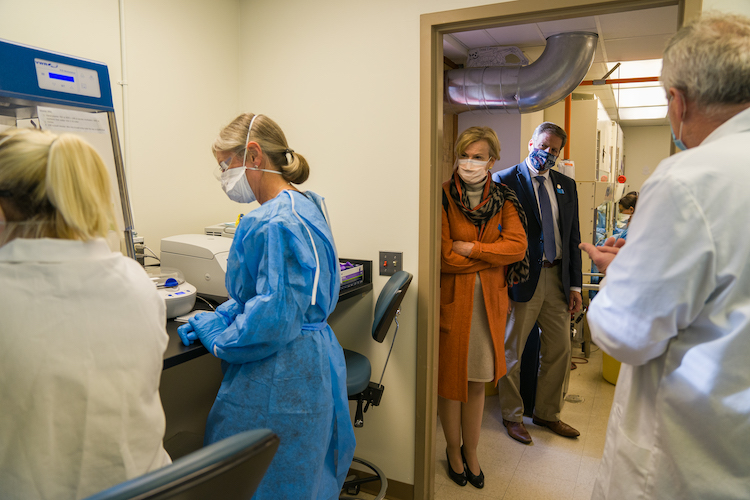
“I’ve really loved working on the front lines,” Leighton says. “I am really proud and happy to have been able to help the community and continue to do that work throughout the whole semester.”
One of the technicians taking the handoff from CLA’s like Leighton is Alyssa Stasse ’22G, a graduate student studying integrative and organismal biology. Stasse extracts RNA from the specimens and uses it to perform PCR analysis, determining whether a test is positive or negative.
“It’s given me a lot more experience with the technology aspect of a lab, which is huge because everything is moving in that direction,” Stasse says of the differences between this work and work she’d previously done in a lab setting. “And because test turnaround time is about one day, if not sooner, it’s been really helpful in the sense of controlling things because students are able to find out right away and either tell people they’ve been close to or isolate. Because we test twice a week it really helps cut down on the chance for outbreaks.”
Those working as testers began by primarily swabbing students, but as UNH was able to provide self-swab tests for students (who have been tested every four days through the semester) instead, the focus at the testing facility shifted to handling faculty and staff tests.
It’s all been a worthwhile experience for Daniel Gebel ’23, a nursing major in the College of Health and Human Services who – like the rest of his classmates – found out that his planned clinical experience in a nursing home environment wouldn’t be possible this year because of COVID-19.
Being able to work as a tester throughout the fall semester has ensured that Gebel still gets to experience critical hands-on opportunities in the medical field, all during what is likely a once-in-a-lifetime circumstance.
“It’s really helped reinforce my desire to be a nurse,” Gebel says. “It’s not every day you live through a historic event like this, and it seems surreal that a few years down the road I’ll be able to tell people that at the height of the pandemic, I was testing people. I can say I went from wearing full PPE and testing people for a virus to a time where we live in a post-COVID world where we are not wearing face masks and not worrying about these types of things.”
In the meantime, those involved in testing remain thankful for the opportunity to keep the community safe and grateful that UNH has set up such a successful program to date – one that wouldn’t have been able to operate so smoothly without the work of students.
“I think it should be the gold standard for other schools around the country,” Ayer says.
-
Written By:
Keith Testa | UNH Marketing | keith.testa@unh.edu















































